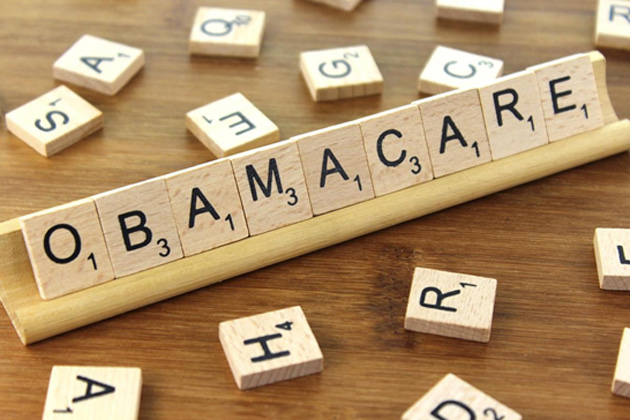| -- | May 16, 2017 Obamacare Will Soon Be Zombiecare By Patrick Watson Obamacare probably doesn’t affect you directly. Most Americans get their health insurance from either their employer or Medicare. If you are a healthcare provider, your job likely existed before Obamacare and will still be there long after. If your income is below $200,000 a year, the healthcare surtax doesn’t add to your tax bill. However… Saying Obamacare doesn’t affect you directly is not the same as saying it doesn’t affect you at all. It certainly does. You and I are part of the economy, and so is healthcare. We are all roped together. That’s actually a good thing because we’re going to need each other next year when Obamacare changes into something else. It’s not going to die… but it won’t be quite alive either. It will be somewhere between alive and dead. That’s right. In 2018, Obamacare may become Zombiecare. 
Photo: AP The Clock Is Ticking Before the election six months ago, few people would have predicted today’s healthcare standoff. Clinton supporters expected Obamacare would continue with some minor adjustments. Those behind Trump assumed Republicans would quickly repeal and replace Obamacare, as repeatedly promised. Instead, the GOP House (barely) passed a replacement plan that the GOP Senate has little interest in pursuing. Negotiations continue, so we’ll see. Unfortunately, time is not on their side. Obamacare is in deep trouble now. As I explained back in March, the insurance companies haven’t been able to run profitably because not enough young and healthy people are buying Obamacare policies. That’s made them raise rates, which drives away more people and ultimately creates a vicious cycle. Insurers have no incentive to stick around and lose money—and they must decide by June 21 whether to stay in the Obamacare exchanges for 2018. In some states, filing deadlines are even sooner. 
Photo: Nick Youngson Yet the Senate seems in no hurry to act. The odds that they will hash out a bill and get the House and the president to agree in the next five weeks are pretty low. Moreover, they can’t just extend the deadline. Insurers need months to reprogram systems, train staff, and build provider networks. Congress can’t dawdle into summer and then unveil something entirely new. If they do, the 2018 rollout will be a catastrophe. So insurers are doing the rational thing. They’re either backing out or raising rates to compensate for all the unknown risks they will be taking. Early signs are ugly: - Maryland’s top insurer, CareFirst Blue Cross, has requested an average 50% rate increase for 2018.
- In Virginia, Anthem Blue Cross is asking for 37.7% higher rates.
- Aetna said it will be pulling out of all Obamacare exchanges nationwide.
- Iowa is down to only one carrier, Medica, which only covers a few counties.
We’ll see more such stories in the coming months. Barring some legislative miracle, the result will be an individual health insurance market with sky-high rates and deductibles—if your area has any insurers at all. Many won’t.  But there’s a twist to this, one few people are noticing. I learned it from healthcare policy expert Robert Laszewski, whom I’ve quoted before. He says Obamacare won’t explode or collapse, even if Congress does nothing. That’s because most of the beneficiaries will still be heavily subsidized under current law. They won’t care what the price is. Here’s how Laszewski explains it. The health insurance companies' defensive strategy is simple: Limit the plan offerings available to ones that bring in the most premium and then drive the rates as high as they need to be in order to protect the insurance company's solvency. Health plan executives realize this will push the unsubsidized and partially subsidized people off the rolls but leave a core enrollment of taxpayer subsidized people insulated against the costs and ultimately profitable for the insurers. Some experts have said that a death spiral by its very nature cannot be stabilized. Under Obamacare, that is not necessarily true. Because of the uniqueness of the program's subsidy system, there is likely a point where a health plan can concentrate its pool of covered people from among the most highly subsidized participants and collect enough premium to end the red ink. That is what these latest big increases are about. So, health insurance companies are happy to take taxpayer money as long as they don’t have to take most taxpayers as customers. They only want price-insensitive poor people. But in cold, hard business terms, it’s probably their best move. Bottom line: In 2018 Obamacare will still exist, but only as taxpayer-provided indigent care. The program’s heart and soul—the grand vision of “Affordable Health Care” for every American—will be gone. What’s left will be a mere shell, stumbling around and consuming resources. Or, as Laszewski called it, Zombiecare. 
Photo: Flickr/Cavin Stuck with the Bill Aside from taxpayers, who loses in this scenario? Not the poor—they’ll have subsidized health insurance. Not the wealthy—they’ll have employer coverage or just pay out of pocket. Not the elderly—they’ll have Medicare. The losers will be in the middle: Working-age people who make too much to get Obamacare subsidies, but not enough to do without insurance. They’re small-business owners and their workers, solo-practicing lawyers and other professionals, independent contractors, and others without employer coverage. These folks are important to the economy. And next year, many will be uninsured. Insurance companies will identify the pain point and raise rates above it to keep them away. Some in this group will get serious illnesses, have accidents, or otherwise need expensive healthcare that they won’t get—which will make them less productive to the economy. The labor market is in an odd balance right now. Even while many remain out of the labor force or underemployed, good workers are scarce in some areas and occupations. Losing productive people to health problems won’t help. But regardless, it appears set to happen. If you’re in the crosshairs, check out my Healthcare Crisis Survival article from last month. Our readers had some helpful ideas. The healthcare industry will feel some pain too, which might show up in stock prices. Hospital stocks are especially vulnerable, since hospitals are legally required to stabilize anyone who checks into the emergency room, even if uninsured and unable to pay. Medical-device and pharmaceutical companies might see lower revenue as well, since uninsured people may not be able to afford the latest drugs and technology. With the economy already stuck in slow-growth zombie mode, we don’t need zombie healthcare too. But it’s what we are going to get. The good news: The impending fiasco might convince the powers-that-be to try some new ideas. Other developed countries have found better ways. We can, too. See you at the top,  Patrick Watson P.S. Next week is our Strategic Investment Conference in Orlando. I’ll be there to bring you the highlights on our SIC Live Blog. Look for more info soon. P.P.S. If you’re reading this because someone shared it with you, click here to get your own free Connecting the Dots subscription. You can also follow me on Twitter: @PatrickW.  | Subscribe to Connecting the Dots—and Get a Glimpse of the Future
We live in an era of rapid change… and only those who see and understand the shifting market, economic, and political trends can make wise investment decisions. Macroeconomic forecaster Patrick Watson spots the trends and spells what they mean every week in the free e-letter, Connecting the Dots. Subscribe now for his seasoned insight into the surprising forces driving global markets. |
 Senior Economic Analyst Patrick Watson is a master in connecting the dots and finding out where budding trends are leading. Patrick is the editor of Mauldin Economics’ high-yield income letter, Yield Shark, and co-editor of the premium alert service, Macro Growth & In come Alert. You can also follow him on Twitter (@PatrickW) to see his commentary on current events. Senior Economic Analyst Patrick Watson is a master in connecting the dots and finding out where budding trends are leading. Patrick is the editor of Mauldin Economics’ high-yield income letter, Yield Shark, and co-editor of the premium alert service, Macro Growth & In come Alert. You can also follow him on Twitter (@PatrickW) to see his commentary on current events.
Share Your Thoughts on This Article

Use of this content, the Mauldin Economics website, and related sites and applications is provided under the Mauldin Economics Terms & Conditions of Use. Unauthorized Disclosure Prohibited The information provided in this publication is private, privileged, and confidential information, licensed for your sole individual use as a subscriber. Mauldin Economics reserves all rights to the content of this publication and related materials. Forwarding, copying, disseminating, or distributing this report in whole or in part, including substantial quotation of any portion the publication or any release of specific investment recommendations, is strictly prohibited.
Participation in such activity is grounds for immediate termination of all subscriptions of registered subscribers deemed to be involved at Mauldin Economics’ sole discretion, may violate the copyright laws of the United States, and may subject the violator to legal prosecution. Mauldin Economics reserves the right to monitor the use of this publication without disclosure by any electronic means it deems necessary and may change those means without notice at any time. If you have received this publication and are not the intended subscriber, please contact service@mauldineconomics.com. Disclaimers The Mauldin Economics website, Yield Shark, Thoughts from the Frontline, Patrick Cox’s Tech Digest, Outside the Box, Over My Shoulder, World Money Analyst, Street Freak, Just One Trade, Transformational Technology Alert, Rational Bear, The 10th Man, Connecting the Dots, This Week in Geopolitics, Stray Reflections, and Conversations are published by Mauldin Economics, LLC. Information contained in such publications is obtained from sources believed to be reliable, but its accuracy cannot be guaranteed. The information contained in such publications is not intended to constitute individual investment advice and is not designed to meet your personal financial situation. The opinions expressed in such publications are those of the publisher and are subject to change without notice. The information in such publications may become outdated and there is no obligation to update any such information. You are advised to discuss with your financi al advisers your investment options and whether any investment is suitable for your specific needs prior to making any investments.
John Mauldin, Mauldin Economics, LLC and other entities in which he has an interest, employees, officers, family, and associates may from time to time have positions in the securities or commodities covered in these publications or web site. Corporate policies are in effect that attempt to avoid potential conflicts of interest and resolve conflicts of interest that do arise in a timely fashion.
Mauldin Economics, LLC reserves the right to cancel any subscription at any time, and if it does so it will promptly refund to the subscriber the amount of the subscription payment previously received relating to the remaining subscription period. Cancellation of a subscription may result from any unauthorized use or reproduction or rebroadcast of any Mauldin Economics publication or website, any infringement or misappropriation of Mauldin Economics, LLC’s proprietary rights, or any other reason determined in the sole discretion of Mauldin Economics, LLC. Affiliate Notice Mauldin Economics has affiliate agreements in place that may include fee sharing. If you have a website or newsletter and would like to be considered for inclusion in the Mauldin Economics affiliate program, please go to http://affiliates.pubrm.net/signup/me. Likewise, from time to time Mauldin Economics may engage in affiliate programs offered by other companies, though corporate policy firmly dictates that such agreements will have no influence on any product or service recommendations, nor alter the pricing that would otherwise be available in absence of such an agreement. As always, it is important that you do your own due diligence before transacting any business with any firm, for any product or service. © Copyright 2017 Mauldin Economics | -- |
